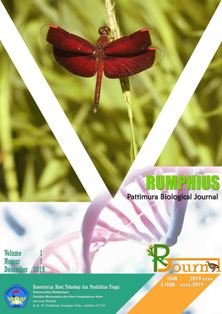THE INFLUENCE OF THE PjBL-HOTS LEARNING MODEL ON LEARNING OUTCOMES COGNITIVE AND METACOGNITIVE IN STUDENTS AT SMAN 5 CENTRAL MALUKU
Abstract
PjBL-HOTS is a learning that emphasizes contextual learning which is implemented through project activities in this project learning is carried out on a hots basis so that students can think more critically, creatively and actively in constructing learning and be able to solve problems in everyday life. This study aims to determine the effect of the PjBL-HOTS learning model on students' cognitive and metacognitive learning outcomes. This research was conducted at SMAN 5 Central Maluku on April 28 to May 28, 2021, which is located in Tulehu village. The method used is a quasi-experimental design. Based on the LSD further test, it shows that PjBLHOTS learning can affect students' cognitive learning outcomes as evidenced by the increase in cognitive and metacognitive learning outcomes with the average difference between the pretest and posttest cognitive results, which is -23.08571 and the average metacognitive value, which is 16.18081. learning that is done without a project. The results of this study indicate that the use of the PjBL-HOTS learning model can affect students' cognitive and metacognitive learning outcomes.
Downloads
References
Bakar, R. 2014. The Effect of Learning Motivation on Students? s Productive Competencies in Vocational High School, West Sumatra," Int. J. Asian Soc. Sci., vol. 4, no. 6, pp. 722–732.
Anggraeni, Anisa Lina. 2017. The Effect of Project-Based Learning on Student Learning Outcomes in Concepts Ecosystem. Thesis is not published. FITK. Natural Sciences Education, Syarif State Islamic University Hidayatullah, Jakarta.
Arifa. A.B. Wibawanto, S. & Wirawan I.M. 2018. Application of the Project Base d Learning Model with Metacognitive Strategies to Improve Metacognition and Learning Outcomes. Malang State University. Journal of Applied Technology Science. IV (3).
Erlinawati. 2018. The Influence of the Project Based Learning Model on Students' Creative Thinking Abilities and Creative Attitudes in Class X Biology Subjects at SMAN 7 Bandar Lampung. Unpublished thesis. FITK, Natural Sciences Education, Islamic University
Fahrudin. M. F. 2015. Differences in Student Biology Learning Outcomes Using Problem Based Learning and Project Based Learning Models and Project Based Learning on Functional Concepts. Unpublished thesis. FITK, Natural Sciences Education, Islamic University
Fauziah Lulu. 2015. The Influence of the PjBL (Project Based Learning) Learning Model on Class XI Students' Creative Thinking Skills on the Concept of Structure and Function of Plant Tissue. Unpublished thesis. FITK, Natural Sciences Education, Islamic University
Hidayat, S. Rojabi, Y.N., & Rahmawati, N.A. 2020. Profile of Students' Metacognitive Skills on the Concept of Bacteria Class X MIPA in Tasikmalaya City. Quangga: Journal of Education and Biology.
Insyasiska, D. Zubaidah, S. Susilo. H. 2015. The Influence of Project Based Learning on Students' Learning Motivation, Creativity, Critical Thinking Ability and Cognitive Ability in Biology Learning.
Ismayanti. 2016. The Relationship Between Metacognition and Intrinsic Motivation and the Academic Achievement of Biology Students at the Faculty of Tarbiyah and Teacher Training,
Mahrawi, M. Usman. Sari, I.J. Laila, F. Ningtiyas, N.A. Astrida, O.N. 2019. The influence of the project based learning (PjBL) learning model on learning outcomes in evolution courses. Proceedings of the National Seminar Education, FKIP, Sultan Ageng Tirtayasa University,
Mitrayani, 2020. The Relationship Between Metacognitive Awareness and Student Biology Learning Outcomes at Muhammadiyah High Schools in Palembang City. Biology Education Study Program. Postgraduate Program. Unpublished thesis. Postgraduate Program, Muhammadiyah University of Palembang.
Authors who propose a manuscript and have it approved for publication know that the manuscript will be registered and become part of the RPBJ. Authors and readers understand that this journal is open and all its contents can be accessed freely, provided that RPBJ is still listed as the source of information. The hope is that this journal can become a vehicle for exchange and scientific knowledge for society and the scientific community, especially in the field of Biology and other branches of science.









